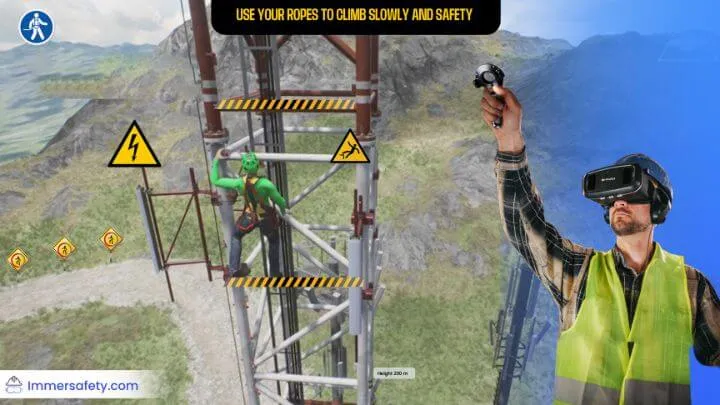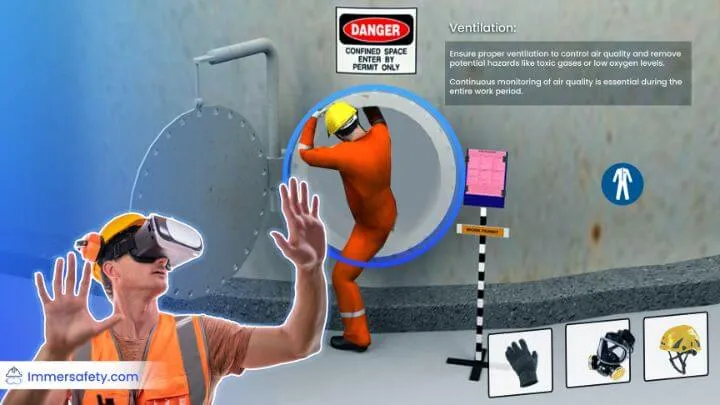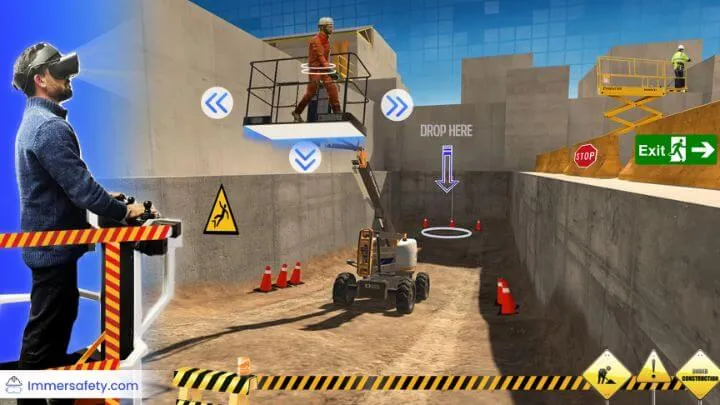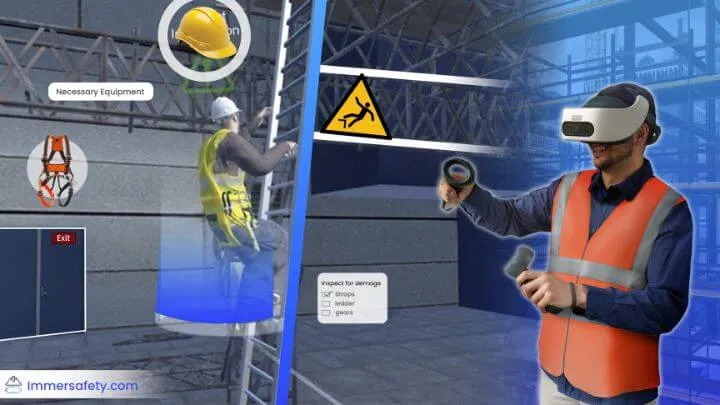Virtual Reality (VR) construction training offers a cutting-edge solution for enhancing workforce skills and safety.
By providing realistic simulations and immersive learning experiences, VR training enables workers to practice and perfect their tasks in a risk-free environment, leading to improved competency, cost savings, and environmental benefits for the construction industry.
What is Virtual Reality Construction Training?

Virtual Reality Construction Training uses VR technology to immerse construction workers in realistic, interactive training environments. By wearing VR headsets, trainees can experience and practice various construction tasks, such as operating machinery or navigating a building site.
For example, a worker might practice using a crane in a virtual environment, gaining hands-on experience without the risk of accidents. This type of training enhances engagement, improves skill retention, and provides a safe, controlled setting for learning, making it a highly effective method for preparing workers for real-life construction challenges.
What is Virtual Reality Construction Safety Training?

Virtual Reality Construction Safety Training uses VR technology to create realistic, interactive environments where construction workers can learn and practice safety procedures. Trainees wear VR headsets to enter a virtual construction site, encountering various scenarios like working at heights or handling heavy machinery.
For example, a worker might practice proper harness usage on a simulated high-rise, learning to avoid falls without the risk of real injury. This method enhances engagement, improves knowledge retention, and provides a safe, controlled environment for learning, making it an effective way to prepare workers for real-life safety challenges on construction sites.
11 Advantages Of VR Construction Training Must Know
1. Enhanced Safety Training

VR construction training allows workers to experience and navigate hazardous situations without any real-world risk. This immersive experience helps them understand safety protocols and procedures better, leading to fewer accidents on the job site.
2. Realistic Simulations
VR provides realistic simulations of construction environments, enabling trainees to practice skills and procedures in a lifelike setting. This hands-on experience helps them gain confidence and proficiency in their tasks.
See our – Work At Height VR Training
3. Cost-Effective Training
VR training reduces the need for physical training materials and facilities, leading to significant cost savings. It also minimizes downtime and productivity loss, as training can be conducted without disrupting ongoing projects.
4. Accessible Anytime, Anywhere
VR training can be accessed from anywhere, making it convenient for workers in remote locations or those with tight schedules. This flexibility ensures that all employees have the opportunity to receive training without logistical constraints.
See Our – fire extinguisher training simulator
5. Consistent Training Experience

With VR, every trainee receives the same high-quality training experience, ensuring consistency in learning outcomes. This uniformity helps maintain a standard level of competence across the workforce.
6. Immediate Feedback and Assessment
VR training systems can provide immediate feedback on performance, allowing trainees to learn from their mistakes in real-time. This instant assessment helps in reinforcing correct procedures and improving overall competency.
7. Customized Training Programs

VR training can be tailored to specific job roles, tasks, and skill levels. This customization ensures that each worker receives relevant and targeted training, enhancing their efficiency and effectiveness on the job.
See Our – Confined Space VR Training
8. Enhanced Engagement and Retention
The immersive nature of VR training increases engagement and motivation among trainees. Studies have shown that interactive and engaging training methods lead to higher retention rates, ensuring that knowledge and skills are retained longer.
9. Safe Practice of High-Risk Tasks
VR allows workers to practice high-risk tasks in a safe environment. They can simulate dangerous scenarios, such as working at heights or operating heavy machinery, without any risk of injury, which helps build confidence and competence.
10. Improved Collaboration and Communication

VR training can include multi-user scenarios, where workers can collaborate and communicate in a virtual environment. This fosters teamwork and improves communication skills, essential for efficient and safe operations on construction sites.
See Our – Virtual Reality Electrical Training
11. Environmental Sustainability

By reducing the need for physical training materials and travel, VR training contributes to environmental sustainability. It lowers the carbon footprint associated with traditional training methods and supports green initiatives in the construction industry.
Using VR for construction training not only enhances safety and efficiency but also offers significant cost savings and environmental benefits. This technology represents the future of training, providing a comprehensive and immersive learning experience for construction workers.
5 Reasons to Invest in VR Construction Training
1. Enhanced Safety:
VR construction training allows workers to experience realistic job site scenarios in a safe and controlled environment. For example, instead of conducting high-risk equipment operation training on an actual construction site, workers can practice in a virtual environment, minimizing the risk of accidents and injuries.
2. Realistic Job Site Experience:
VR training provides an immersive experience that closely replicates real-world job site conditions. For instance, trainees can operate heavy machinery or conduct site inspections in virtual simulations, gaining hands-on experience without being exposed to the dangers of an actual construction site.
3. Cost Savings:
Traditional construction training methods can be costly and time-consuming. With VR construction training, companies can save on expenses such as travel, equipment rental, and instructor fees. For example, instead of sending employees to off-site training facilities, companies can provide VR training sessions that can be accessed remotely from anywhere.
See Our All & Request Demo – Virtual Reality Safety Training Modules
4. Increased Efficiency:
VR construction safety training enables workers to learn at their own pace and repeat exercises as needed, leading to faster skill acquisition and mastery. For instance, workers can practice complex tasks in VR simulations until they feel confident, reducing the time needed for traditional training methods.
5. Remote Training Capabilities:
With VR technology, construction companies can deliver training to workers located in different geographical locations. For example, a multinational construction firm can conduct virtual training sessions for employees spread across multiple countries, saving time and resources associated with travel.
FAQ’s
What is VR construction training, and how does it work?
VR construction training utilizes virtual reality technology to simulate construction environments and scenarios, allowing trainees to immerse themselves in realistic job site experiences. Through VR headsets or other devices, participants interact with virtual objects, machinery, and environments, gaining hands-on experience without the risks associated with traditional training methods.
How does VR construction training improve safety?
VR construction training allows workers to practice safety protocols and procedures in simulated job site scenarios, preparing them to identify and mitigate potential hazards effectively. By experiencing realistic safety challenges in a virtual environment, trainees develop the skills and confidence needed to prioritize safety on actual construction sites.
Can VR construction training be tailored to specific job roles or tasks?
Yes, VR construction training can be customized to address the unique needs and requirements of different job roles, tasks, and skill levels within the construction industry. From equipment operation and site inspection to project management and hazard awareness, VR simulations can be adapted to meet the training needs of various construction professionals.
Is VR construction safety training suitable for remote or distributed teams?
Absolutely. VR construction safety training is highly adaptable and can be delivered to remote or distributed teams using VR headsets, desktop applications, or online platforms. By leveraging VR technology, construction companies can conduct remote training sessions, collaborate virtually, and ensure consistent safety standards across all project sites.
Conclusion:
The benefits of investing in VR construction training are undeniable. From enhancing safety and efficiency to reducing costs and environmental impact, VR simulations offer a transformative learning experience that empowers construction professionals to excel in their roles.
As the construction industry continues to evolve, embracing VR training is not just an investment in technology—it’s an investment in the future success of construction companies and their workforce.


